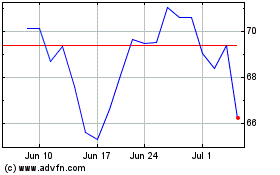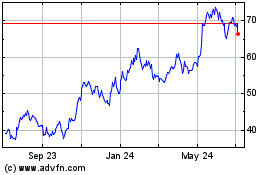Today's Logistics Report: Resilient Food Supply Chains; Walmart Pops Up; Crude's Slipping Demand
November 13 2020 - 9:52AM
Dow Jones News
By Paul Page
Sign up: With one click, get this newsletter delivered to your
inbox.
Food supply chains have bent under the coronavirus pandemic but
they haven't broken. Food supplies have defied dire warnings of
global shortages by holding up through months of turmoil, the WSJ's
Lucy Craymer reports, as suppliers, distributors and markets have
adapted to disruptions from production to transportation. The value
of food imported in the first half of 2020 was roughly in line with
the first of half of 2019, one sign that food supply chains "have
been remarkably resilient," says Michael Rogers, chief executive of
Australian Fresh Produce Alliance. There have been problems along
the way, especially in fruit and vegetable supply chains, but
experts say some nations abandoned protectionist policies adopted
earlier in the pandemic and developing countries have filled supply
gaps. Food organizations warn that levels of acute hunger are
growing as economies and incomes falter, however, and that delays
at ports are persisting.
SUPPLY CHAIN STRATEGIES
Walmart Inc. is adding another tool to its logistics kit for the
holidays. The retailer is placing "pop-up" fulfillment centers into
many of its regional distribution facilities, the WSJ Logistics
Report's Jennifer Smith writes, as it braces for an expected surge
in online sales in the coming weeks. Parcel carriers are already
warning of delivery delays and retailers are urging consumers to
get orders in early this year, a result of coronavirus-driven
demand that promises to strain peak-season supply chains. Walmart
is partitioning off parts of its sprawling distribution centers
that normally handle palletized goods and using software to
synchronize the sites with stores and its broader logistics
systems. The strategy is the latest by retailers trying to adapt
existing supply chains to the explosion in online sales. Walmart,
Target Corp. and others are using stores to handle some
fulfillment, but Walmart's pop-up plan suggests that tactic has
limits.
QUOTABLE
COMMODITIES
A prospective coronavirus vaccine won't solve the oil sector's
woes anytime soon. The International Energy Agency gave a darker
outlook for crude consumption in its latest monthly report, the
WSJ's David Hodari reports, citing resurgent Covid-19 infection
rates in the U.S. and Europe that it says will slash demand at
least into the first quarter of 2021. That's grim news for a crude
tanker market that has been foundering since a boost from so-called
floating storage in the spring dissipated. Transport heavyweight
Teekay Tankers Inc. just reported that its net profit hit $3.1
million in the third quarter, an improvement from a loss a year ago
but down more than 96% from the second quarter. The IEA report
holds out some hope for the sector, noting expectations for crude
demand in the economic powerhouses of the developing world such as
China and India is improving.
IN OTHER NEWS
The U.K. economy expanded 15.5% in the third quarter, a weaker
pace than its peers in Europe. (WSJ)
U.S. initial jobless claims slipped in the past week to the
lowest level since March. (WSJ)
U.S. consumer prices were flat in October despite higher costs
for dining out and groceries. (WSJ)
Nissan Motor Co. trimmed its outlook for a loss this year on
improving prices and tight automotive inventory. (WSJ)
Cosmetics maker Revlon Inc. says it has enough support from
creditors to avert a bankruptcy filing. (WSJ)
Ministers from 15 Asia-Pacific countries agreed to sign the
Regional Comprehensive Economic Partnership trade agreement.
(Nikkei Asian Review)
Apple Inc. supplier Pegatron Corp. is considering adding a
factory in the U.S. to speed up parts deliveries. (Taipei
Times)
Industrial goods supplier Schneider Electric Inc. will spend $40
million to upgrade its U.S. supply chain. (Supply Chain Dive)
Maritime supply chains have grown increasingly strained under
this year's sharp swings in demand. (Lloyd's List)
Taiwan's Yang Ming Marine Transport Corp. swung to a $92 million
third-quarter profit and the container line said it will "set
financial stability as its priority." (Journal of Commerce)
At least 20 bulk carriers have been stranded, some for months,
unable to unload millions of tons of Australian coal.
(Bloomberg)
DHL Express projects U.S. parcel volumes will surge 30% this
year over normal peak-season growth. (Logistics Management)
Emirates Airlines fell to its first loss in more than 30 years
in the first half of the year. (Reuters)
Singapore Airlines plans to issue $630 million in convertible
bonds to shore up its cash position. (Straits Times)
Glyn Hughes was named head of the International Air Cargo
Association. (Air Cargo News)
Developer CBRE plans to convert a golf course and country club
south of Chicago into a 130-acre logistics park. (Chicago
Tribune)
Private-equity firm Welsh, Carson, Anderson & Stowe is
buying logistics technology provider TrueCommerce. (DC
Velocity)
U.S. safety investigators say Walmart implemented new
truck-driver fatigue guidelines after the fatal 2014 crash that
injured comedian Tracy Morgan. (Commercial Carrier Journal)
ABOUT US
Paul Page is editor of WSJ Logistics Report. Follow the WSJ
Logistics Report team: @PaulPage, @jensmithWSJ and @CostasParis.
Follow the WSJ Logistics Report on Twitter at @WSJLogistics.
Write to Paul Page at paul.page@wsj.com
(END) Dow Jones Newswires
November 13, 2020 09:37 ET (14:37 GMT)
Copyright (c) 2020 Dow Jones & Company, Inc.
Teekay Tankers (NYSE:TNK)
Historical Stock Chart
From Mar 2024 to Apr 2024

Teekay Tankers (NYSE:TNK)
Historical Stock Chart
From Apr 2023 to Apr 2024
